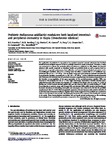Probiotic Pediococcus acidilactici modulates both localised intestinal- and peripheral-immunity in tilapia (Oreochromis niloticus)
| dc.contributor.author | Standen, BT | |
| dc.contributor.author | Rawling, Mark | |
| dc.contributor.author | Davies, SJ | |
| dc.contributor.author | Castex, M | |
| dc.contributor.author | Foey, Andrew | |
| dc.contributor.author | Gioacchini, G | |
| dc.contributor.author | Carnevali, O | |
| dc.contributor.author | Merrifield, Daniel | |
| dc.date.accessioned | 2018-10-24T10:37:38Z | |
| dc.date.available | 2018-10-24T10:37:38Z | |
| dc.date.issued | 2013-10 | |
| dc.identifier.issn | 1050-4648 | |
| dc.identifier.issn | 1095-9947 | |
| dc.identifier.uri | http://hdl.handle.net/10026.1/12612 | |
| dc.description.abstract |
The application of probiotics in aquaculture has received concerted research efforts but the localised intestinal immunological response of fish to probiotic bacteria is poorly understood. Therefore, a study was conducted to evaluate the probiotic effect of Pediococcus acidilactici on Nile tilapia (Oreochromis niloticus) with specific emphasis on intestinal health and probiotic levels as well as system level responses such as growth performance, feed utilization and haemato-immunological parameters under non-challenged conditions. Fish (9.19 ± 0.04 g) were fed either a control diet or a P. acidilactici supplemented diet (at 2.81 × 10(6) CFU g(-)(1)) for six weeks. At the end of the study the probiotic was observed to populate the intestine, accounting for ca. 3% (1.59 × 10(5) CFU g(-)(1)) of the cultivable intestinal bacterial load. Real-time PCR indicated that the probiotic treatment may potentiate the immune-responsiveness of the intestine as up-regulation of the gene expression of the pro-inflammatory cytokine TNFα was observed in the probiotic fed fish (P < 0.05). Light microscopy observations revealed elevated intraepithelial leucocyte (IEL) levels in the intestine of P. acidilactici fed tilapia after six weeks (P < 0.05) of feeding and a trend towards elevated goblet cells was also observed after six weeks feeding (P = 0.08). Concomitantly at week six, along with elevated IELs and elevated TNFα mRNA levels in the intestine, an increased abundance of circulating neutrophils and monocytes were observed in fish fed the probiotic supplemented diet (P < 0.05). This haemopoietic expansion of innate immune cells could be reflective of an elevated state of immuno-readiness. Together these results suggest that the probiotic has a protective action on the intestinal mucosal cells, stimulating the innate immune response after feeding for a period of six weeks. These immunological modulations did not impair growth performance or the remaining haematological and zootechnical parameters compared to the control group (P > 0.05). | |
| dc.format.extent | 1097-1104 | |
| dc.format.medium | Print-Electronic | |
| dc.language | en | |
| dc.language.iso | eng | |
| dc.publisher | Elsevier BV | |
| dc.subject | Gut | |
| dc.subject | Fish | |
| dc.subject | Health | |
| dc.subject | Aquaculture | |
| dc.subject | Gene expression | |
| dc.title | Probiotic Pediococcus acidilactici modulates both localised intestinal- and peripheral-immunity in tilapia (Oreochromis niloticus) | |
| dc.type | journal-article | |
| dc.type | Journal Article | |
| dc.type | Randomized Controlled Trial | |
| dc.type | Research Support, Non-U.S. Gov't | |
| plymouth.author-url | https://www.webofscience.com/api/gateway?GWVersion=2&SrcApp=PARTNER_APP&SrcAuth=LinksAMR&KeyUT=WOS:000324849800005&DestLinkType=FullRecord&DestApp=ALL_WOS&UsrCustomerID=11bb513d99f797142bcfeffcc58ea008 | |
| plymouth.issue | 4 | |
| plymouth.volume | 35 | |
| plymouth.publication-status | Published | |
| plymouth.journal | Fish & Shellfish Immunology | |
| dc.identifier.doi | 10.1016/j.fsi.2013.07.018 | |
| plymouth.organisational-group | /Plymouth | |
| plymouth.organisational-group | /Plymouth/Faculty of Health | |
| plymouth.organisational-group | /Plymouth/Faculty of Health/School of Biomedical Sciences | |
| plymouth.organisational-group | /Plymouth/Faculty of Science and Engineering | |
| plymouth.organisational-group | /Plymouth/Faculty of Science and Engineering/School of Biological and Marine Sciences | |
| plymouth.organisational-group | /Plymouth/REF 2021 Researchers by UoA | |
| plymouth.organisational-group | /Plymouth/REF 2021 Researchers by UoA/UoA01 Clinical Medicine | |
| plymouth.organisational-group | /Plymouth/REF 2021 Researchers by UoA/UoA01 Clinical Medicine/UoA01 Clinical Medicine | |
| plymouth.organisational-group | /Plymouth/REF 2021 Researchers by UoA/UoA06 Agriculture, Veterinary and Food Science | |
| plymouth.organisational-group | /Plymouth/Research Groups | |
| plymouth.organisational-group | /Plymouth/Research Groups/Institute of Translational and Stratified Medicine (ITSMED) | |
| plymouth.organisational-group | /Plymouth/Research Groups/Institute of Translational and Stratified Medicine (ITSMED)/CBR | |
| plymouth.organisational-group | /Plymouth/Users by role | |
| plymouth.organisational-group | /Plymouth/Users by role/Academics | |
| plymouth.organisational-group | /Plymouth/Users by role/Researchers in ResearchFish submission | |
| dc.publisher.place | England | |
| dcterms.dateAccepted | 2013-07-10 | |
| dc.identifier.eissn | 1095-9947 | |
| dc.rights.embargoperiod | Not known | |
| rioxxterms.versionofrecord | 10.1016/j.fsi.2013.07.018 | |
| rioxxterms.licenseref.uri | http://www.rioxx.net/licenses/all-rights-reserved | |
| rioxxterms.licenseref.startdate | 2013-10 | |
| rioxxterms.type | Journal Article/Review |


